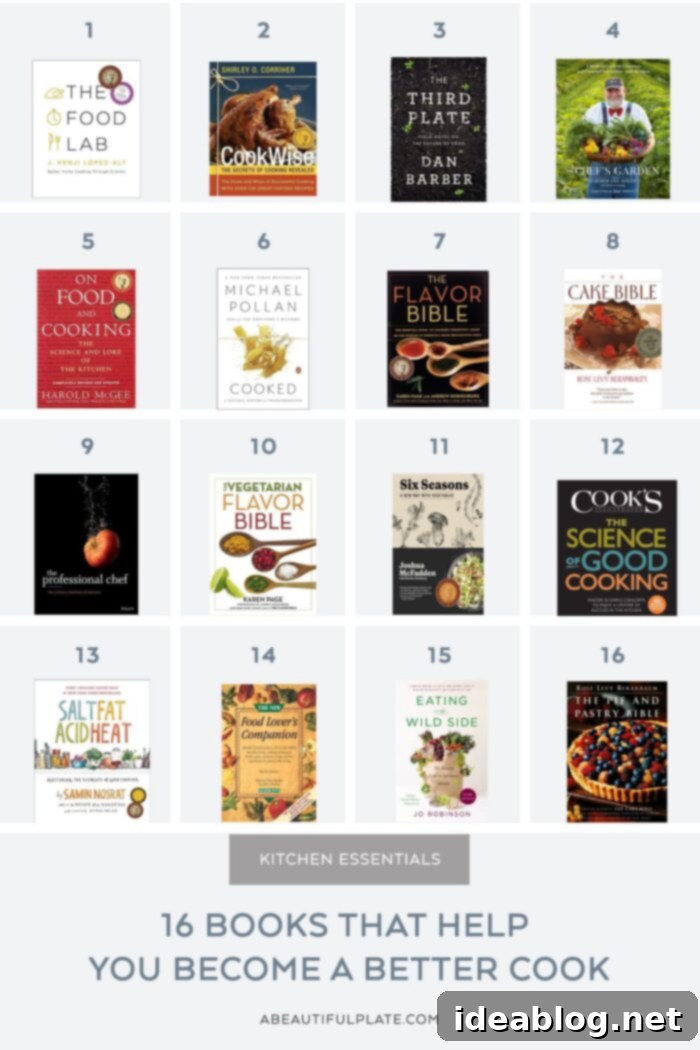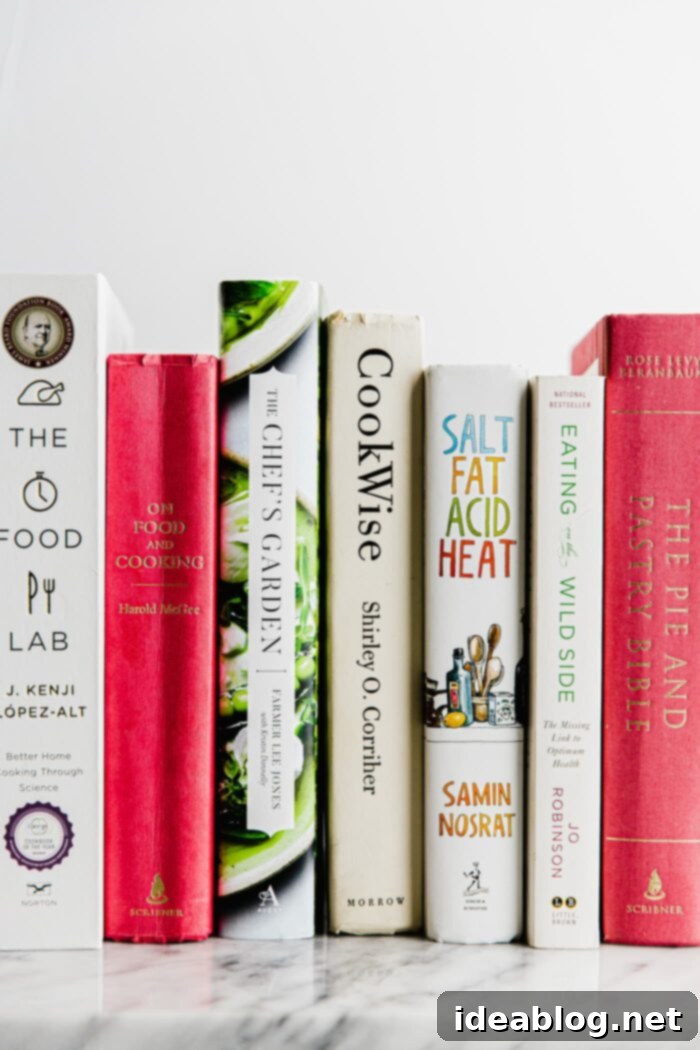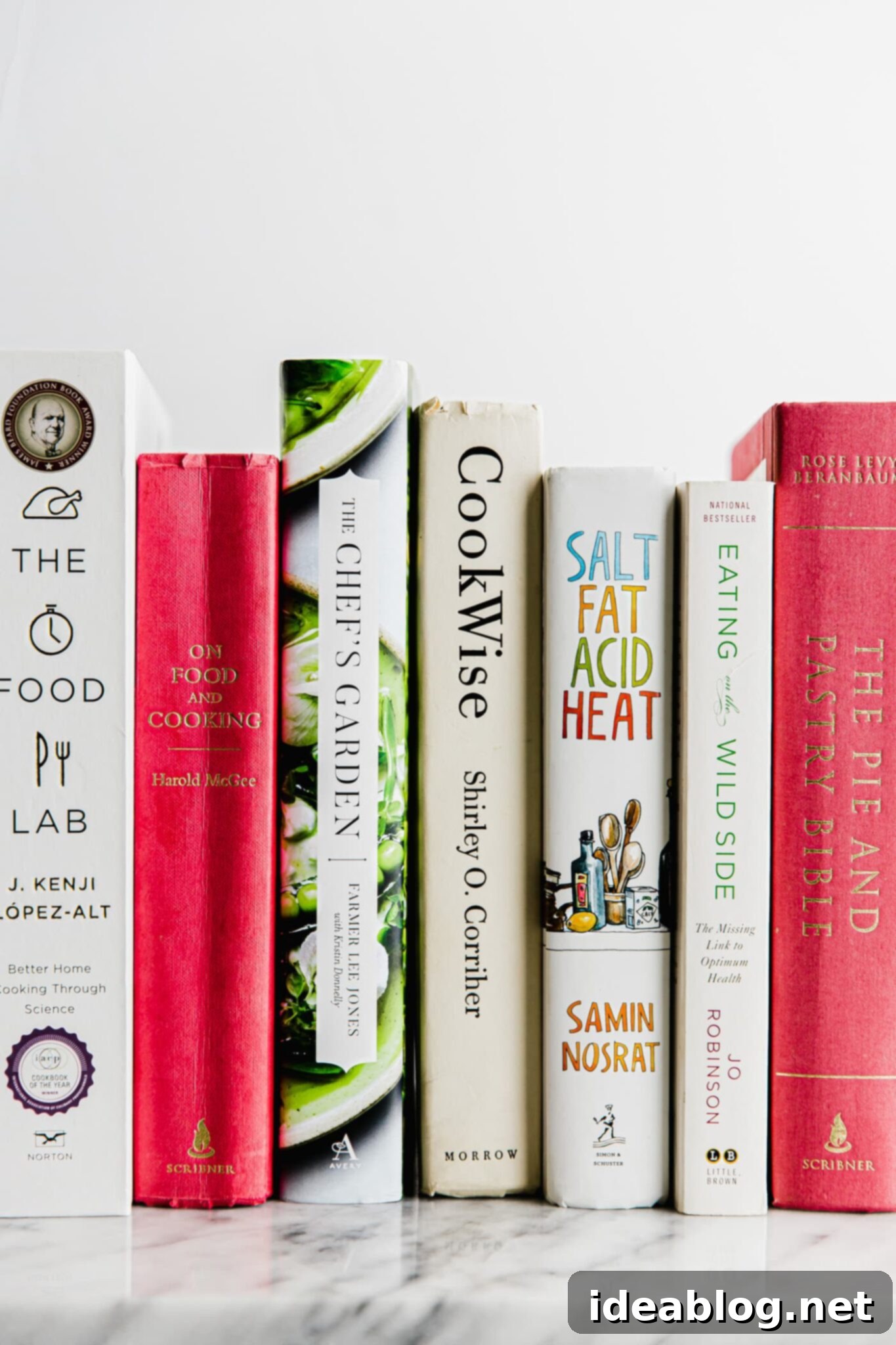Master Your Kitchen: The Ultimate Guide to Essential Cooking Books for Every Chef

Embarking on a culinary journey, whether as a novice or an experienced home cook, often leads to a desire for deeper understanding and greater proficiency in the kitchen. Today, we’re thrilled to share an updated and comprehensive list of our most cherished cooking reference books – a collection that has profoundly influenced our approach to food and cooking. These are not just recipes; they are foundational texts that we revisit constantly, each time discovering new insights that refine our techniques and spark creativity.
These essential cooking books have been instrumental in transforming us into more creative, intuitive, and mindful cooks. Some of these invaluable titles first crossed our path during rigorous culinary school training, providing a structured bedrock of knowledge. Over the years, many new additions, often gifted or newly published, have quickly earned their place in our culinary library, captivating us with their unique perspectives and practical wisdom. This carefully curated selection includes everything from dense scientific guides to inspiring non-fiction explorations of our food system, ensuring there’s something to ignite passion in every type of cook.
If your ambition is to cultivate a more intuitive cooking style, to truly grasp the fundamental “why’s” behind every technique and ingredient, or simply to broaden your understanding of the intricate global food system, then we wholeheartedly recommend diving into these remarkable titles. Adding them to your personal collection will not only enhance your kitchen skills but also enrich your entire relationship with food, making every meal a more thoughtful and enjoyable experience. Prepare to unlock a world of culinary knowledge and transform the way you cook.
Our diverse list features a variety of book types to cater to every learning style and culinary interest. You’ll find several dense, encyclopedic reference books that delve deep into scientific principles, alongside traditional cookbooks brimming with meticulously tested recipes. We’ve also included specialized guides focusing on particular categories, such as the art of pies and pastries, for those who wish to master specific niches. A small but impactful handful of non-fiction books offer enlightening perspectives on food history, culture, and sustainability. Regardless of their format or focus, every single book on this list is outstanding, offering immense value and practical wisdom that extends far beyond the pages. Get ready to elevate your cooking and truly savor the process!
Top 16 Essential Cooking Books for Culinary Excellence:
- The Food Lab: Better Home Cooking Through Science by J. Kenji López-Alt – A monumental achievement in culinary literature, this book is an absolute must-have for any Serious Eats enthusiast or curious home cook eager to understand the scientific underpinnings of great cooking. Kenji López-Alt, with his methodical scientific approach, meticulously dissects common cooking challenges to reveal the most effective and delicious methods for preparing virtually any dish. This isn’t just a cookbook; it’s a comprehensive textbook (and a hefty one at that!) that demystifies everything from achieving the perfect sear on a steak to making the crispiest roasted potatoes. It empowers you with the knowledge to troubleshoot recipes and innovate in your own kitchen, explaining the ‘why’ behind successful cooking with clarity and wit.
- CookWise: The How’s and Why’s of Successful Cooking by Shirley O. Corriher’s – This ingenious book brilliantly bridges the gap between a traditional cookbook and a foundational reference guide. Shirley Corriher, a renowned food scientist, possesses a unique talent for explaining complex chemical reactions in the kitchen in an accessible manner. We’ve frequently turned to this book to fine-tune existing recipes, understand the precise roles of various ingredients, and master critical techniques. Corriher challenges conventional wisdom, diving deep into topics ranging from the nuances of bread making to the secrets of perfect cookies and cakes, and even essential staples like stocks and roast chicken. It’s a treasure trove for anyone looking to gain a deeper, scientific understanding of their culinary endeavors.
- The Third Plate: Field Notes on the Future of Food by Dan Barber – Without a doubt, this stands as one of the most profound and thought-provoking books on the food system we’ve encountered. Dan Barber, an acclaimed chef and restaurateur, takes readers on a compelling journey through the evolution of our food system, revealing how it has shaped our plates and palates today. He advocates for a revolutionary approach to eating that redefines taste and sustainability. This incredibly well-written narrative doesn’t just inform; it challenges perceptions and inspires a fundamental shift in how we source, appreciate, and utilize ingredients. It’s an indispensable read for anyone passionate about the future of food and sustainable culinary practices.
- The Chef’s Garden: A Modern Guide to Common and Unusual Vegetables by Farmer Lee Jones – A truly stunning and invaluable new addition to our culinary library, this magnificent volume is an exhaustive guide to over 600 varieties of both common and extraordinary vegetables. Farmer Lee Jones, a pioneer in sustainable agriculture, shares unparalleled insights into the world of produce. Each meticulously organized section provides crucial information on how to expertly select, properly store, thoroughly clean, and creatively utilize every ingredient to maximize its flavor and nutritional value. Furthermore, the book features 125 innovative and often complex recipes crafted by Jamie Simpson, the executive chef at The Chef’s Garden Culinary Vegetable Institute, offering sophisticated inspiration for showcasing these incredible vegetables.
- On Food and Cooking: The Science and Lore of the Kitchen by Harold McGee – If forced to choose just one single cooking reference book for an entire lifetime, this seminal work by Harold McGee would be our undisputed choice. It is genuinely difficult to articulate the depth of our admiration for this extraordinary book. Have you ever pondered the precise role sugar plays in the structure of baked goods? Or why slicing onions invariably brings tears to your eyes? We confidently guarantee that you will find comprehensive and fascinating answers to these and countless other culinary curiosities within its pages. Despite its encyclopedic scope, McGee’s writing is surprisingly approachable and engaging, transforming complex scientific concepts into compelling narratives that are a joy to read for cooks of all levels. This book is a true masterpiece that belongs in every serious kitchen.
- Cooked: A Natural History of Transformation by Michael Pollan – While perhaps not as lighthearted or immediately engaging as The Third Plate, Michael Pollan’s Cooked offers an equally captivating and profoundly insightful exploration into the very essence of human cuisine. Pollan embarks on an ambitious journey to uncover the historical and societal significance of the four classical elements of cooking: fire, water, air, and earth. Through this lens, he examines how these fundamental processes have shaped not only our food but also our societies, cultures, and our relationship with nature. It’s a fascinating deep dive into the origins and impact of cooking, revealing how these ancient transformations continue to connect us to our past and define our present.
- The Flavor Bible: The Essential Guide to Culinary Creativity, Based on the Wisdom of America’s Most Experienced Chefs by Karen Page and Andrew Domenburg – This truly unique and invaluable reference book is entirely dedicated to the art and science of ingredient pairings. Presented primarily in a list format (with the exception of an insightful introduction), The Flavor Bible is our go-to resource whenever we’re seeking inspiration for new recipe ideas or aiming to infuse a familiar dish with a distinctive and innovative twist. It acts as an incredible creative springboard, offering a vast repository of compatible flavors. If your goal is to master the art of improvising in the kitchen, customize your cherished recipes, or embark on creating your own signature dishes from scratch, then this is an absolutely indispensable tool that will empower your culinary imagination.
- The Cake Bible by Rose Levy Beranbaum – More than just a traditional cookbook, The Cake Bible is an unparalleled masterclass in baking, thanks to Rose Levy Beranbaum’s extraordinarily thorough recipes, insightful chapter introductions, and meticulous instructions. Beranbaum sets a gold standard for precision, providing ingredient amounts down to the half gram, alongside volume and ounce measurements. Crucially, she doesn’t just tell you *what* to do; she meticulously *explains the why’s* behind every technique and ingredient choice for each recipe. If you’ve ever questioned the necessity of specific steps in cake baking, by the time you’ve absorbed her detailed guidance, you’ll gain a profound understanding and newfound appreciation for the science and artistry involved. This book is essential for anyone serious about mastering the art of cake making.

- The Professional Chef by The Culinary Institute of America – This authoritative textbook is precisely what students at the prestigious Culinary Institute of America receive during their enrollment, signifying its status as a cornerstone of professional culinary education. While we may not consult these types of comprehensive textbooks on a daily basis, we firmly believe that possessing a high-quality, professional reference like this is absolutely essential for anyone with a serious passion for cooking. It covers a vast array of techniques, recipes, and foundational knowledge. Its immense value is further enhanced by detailed step-by-step photography, which proves invaluable for mastering new and intricate skills, such as learning how to precisely fillet fish or perfecting various knife cuts and preparations. This book is an investment in your long-term culinary development.
- The Vegetarian Flavor Bible: The Essential Guide to Culinary Creativity with Vegetables, Fruits, Grains, Legumes, Nuts, Seeds, and More, Based on the Wisdom of Leading American Chefs by Karen Page and Andrew Domenburg – Building upon the groundbreaking success of its predecessor, this specialized version offers an equally comprehensive and inspiring resource tailored specifically for plant-based cooking. The Vegetarian Flavor Bible provides an A-Z compendium of flavor pairings designed for an extensive range of ingredients, including vegetables, fruits, grains, nuts, legumes, seeds, and many more. It’s an indispensable guide for vegetarians, vegans, and anyone looking to incorporate more plant-forward dishes into their repertoire, empowering cooks to create incredibly flavorful and harmonious vegetarian meals with confidence and creativity.
- Six Seasons: A New Way with Vegetables by Joshua McFadden and Martha Holmberg – This captivating cookbook offers an incredibly approachable and visually stunning collection of seasonal recipes that prioritize flavor without requiring a multitude of ingredients or excessive fuss. While it might not be categorized as a traditional “reference cookbook” in the academic sense, Six Seasons nonetheless provides invaluable guidance and practical tips on how to expertly coax the most vibrant and delicious flavors out of seasonal vegetables. Joshua McFadden’s philosophy celebrates the unique characteristics of produce throughout the year, inspiring cooks to embrace the bounty of each season. You will undoubtedly fall in love with this book for its fresh perspective and delicious, achievable recipes.
- The Science of Good Cooking by America’s Test Kitchen – For those who appreciate a meticulously tested and scientifically informed approach to cooking, this comprehensive reference book is a true gem. Developed by the experts at America’s Test Kitchen, it delves into 50 fundamental cooking concepts, each accompanied by rigorously developed recipes that demonstrate the principles in action. If you’re a devoted reader of Cook’s Illustrated and America’s Test Kitchen magazines and articles, you’ll find this book’s format and dedication to empirical understanding highly familiar and immensely satisfying. It’s perfect for home cooks who want to move beyond simply following recipes and truly understand the scientific reasons why certain techniques yield superior results.
- Salt Fat Acid Heat: Mastering the Elements of Good Cooking by Samin Nosrat – Samin Nosrat’s groundbreaking book performs an incredible feat: it distills the overwhelming complexity of cooking into four fundamental elements – salt, fat, acid, and heat – and teaches their balance in an extraordinarily approachable, easy-to-understand, and utterly captivating way. More than just a cookbook, it’s an invaluable resource for cooks across all skill levels, reading almost like an engaging novel while simultaneously imparting profound culinary wisdom. Nosrat’s clear explanations and charming illustrations empower readers to improvise, correct mistakes, and create delicious food without strict adherence to recipes. It is arguably one of the most accessible yet impactful reference books on this entire list, a true game-changer for kitchen confidence.
- Food Lover’s Companion by Ron and Sharen Herbst – This wonderfully compact and incredibly user-friendly glossary is an indispensable pocket guide for navigating the vast and sometimes intimidating world of food. If you’re searching for quick, clear definitions for nearly every imaginable food ingredient, cooking technique, or international dish, this book is simply fantastic. It becomes particularly valuable when you start exploring more complicated, technique-driven cookbooks or venturing into international cuisines, encountering unfamiliar ingredients at specialty supermarkets, or simply trying to decipher a new dish on a restaurant menu. Its comprehensive yet concise format makes it an invaluable reference for expanding your culinary vocabulary and confidence in diverse food environments.
- Eating on the Wild Side: The Missing Link to Optimizing Your Health with Foods You Already Eat by Jo Robinson – This enlightening book delves into the fascinating subject of reclaiming many of the vital nutrients in our food that have been diminished or lost due to modern agricultural practices. Jo Robinson presents meticulously researched information in a highly engaging narrative, exploring practical topics such as identifying which tomatoes in a standard grocery store boast the highest phytonutrient content, or the most effective ways to select and store lettuce to maximize its nutritional value. What makes this book particularly appealing is its practical, non-preachy approach, offering actionable tips and scientific insights that everyone can easily apply to how they choose and prepare their ingredients. It reads like a captivating novel, yet serves as an invaluable reference that you’ll return to repeatedly for sensible, science-backed advice on healthier eating.
- The Pie and Pastry Bible by Rose Levy Beranbaum – For anyone with a profound love for baking pies and pastries, this exceptional book is another absolute staple that deserves a prime spot on your kitchen shelf. Formatted with the same rigorous attention to detail and scientific precision as Beranbaum’s celebrated The Cake Bible, this comprehensive cookbook focuses entirely on the intricate world of pies and pastries. It covers an extensive range of topics, including various tarts, quiches, delicate laminated doughs (like puff pastry and croissant dough), homemade ice creams, a myriad of fillings and toppings, and exquisite glazes. Beranbaum’s meticulous instructions and explanations will guide you through every step, ensuring perfect, professional-quality results every time.
We hope this curated list of essential cooking books inspires you to explore new culinary horizons and deepen your understanding of the art and science of cooking. Each book offers a unique pathway to becoming a more confident, creative, and knowledgeable chef in your own kitchen. For further guidance and to continue expanding your culinary repertoire, be sure to explore our other insightful cooking guides. Happy cooking and happy reading!
